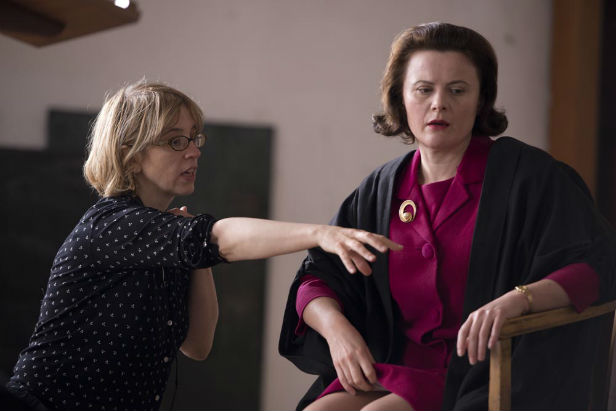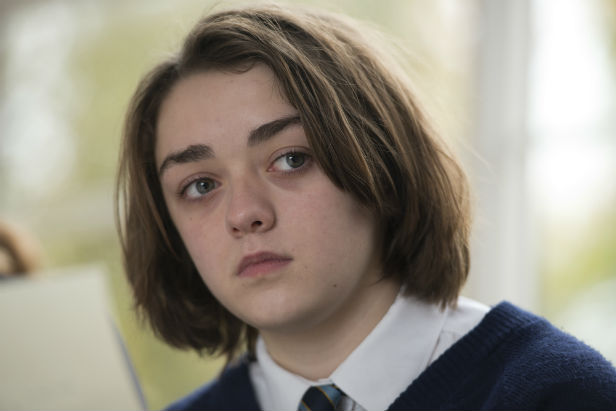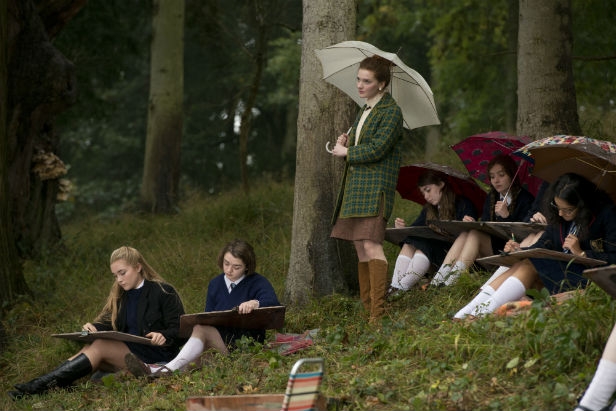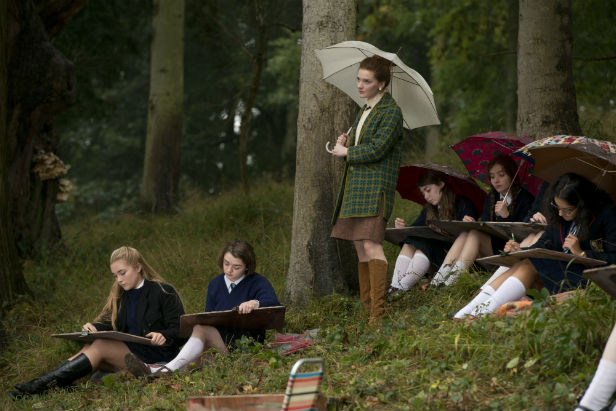Carol Morley’s Dreams Of A Life rightly garnered the writer-director a great deal of attention and acclaim. Now, she turns away from documentary filmmaking with The Falling, a magical realism tale of an outbreak of fainting fits at an all-girls school in 1969. Game Of Thrones‘ Maisie Williams stars as Lydia, whose life changes dramatically after a traumatic incident, and who begins to affect everyone around her.
We sat down with Morley to discuss the film’s influences, why it’s so tough to categorise, casting Arya Stark and why she hopes that people have very different opinions on her film.
What was the starting point for The Falling? Were you interested in the condition?
A few years ago I made a short film about mass hysteria, mass psychogenic illness, and got to know some of the ideas behind it, both from a scientific, psychological point of view, medical and all of that, and also the mystical elements. Because they’ve happened since medieval times in different ways, shapes and forms. So I grew very interested.
I thought ‘One day I want to make a feature film set in a girls’ school,’ because so many of them happen in a girls’ school, single sex institutions, so they do sometimes happen in army barracks but about 80% of outbreaks are in female [institutions], so nunneries, convents, that kind of thing. So I was just fascinated by the idea of a collective almost protest and to this day, even though there’s theories around mass psychogenic illness, nobody really knows why they happen. So they are the mystery that we live with, if you like. I wanted with The Falling to make a really twisted coming of age story that actually, for me, represented more of the angst of adolescence.
Had you always conceived it as being set in the ’60s?
Yeah, well I felt it was looking at, in a way, some of the possible rationales behind an outbreak. And an outbreak will usually reflect the anxieties of the time. A bit like science fiction will reflect the anxieties of its time, so in the ’50s it was atomic and all of that, so an outbreak of mass hysteria would nowadays be about something in the food or a chemical released in the water. When I was looking at the outbreaks in medical journals and stuff in the ’60s there would be much more around sexual anxiety of times times becoming freer, or at least the representation of that on TV and stuff.
I did a lot of interviews with people that had been to a school at that time, because it’s a girls’ grammar school in the film and it was 1969, it was on the cusp of education changing quite a lot. Someone I interviewed remembered her headmistress, and said it was really shocking because she wore red lipstick. It was sort of a frisson, so I really wanted Monica [Dolan] to wear red lipstick!
The school setting is obviously the perfect catalyst in the film; were there any films that use that in a similar way that you looked at for inspiration?
The thing about girls’ schools, I remember reading my sister’s Bunty magazines which had the four Marys who were at boarding school. I went to a big comprehensive, a mixed school but I think I always had a fantasy about girls’ school. I really love Lindsay Anderson’s If…so I think If… was an inspiration, as was Picnic At Hanging Rock. And also to some extent, although it’s not quite so much in a school, Heavenly Creatures. I studied Fine Art and Film at St Martins so it is of course about the story but it’s also how the story is told. And I was interested in almost trying to create a sense of hysteria within the film itself. So that’s why we have the flash frames and almost subliminal images so it’s almost as though something’s breaking down within the film. The film is having its own hysteria.
Did The Falling require a very different approach from Dreams Of A Life?
Well I think that, for me, anything I’ve ever made I just approach differently. I think for me it’s just you always want to feel like you’re doing something for the first time. That’s what’s exciting. With The Falling all of it was fictional, which was a relief after Dreams Of A Life! When you do a documentary there’s a responsibility to the real people and I constantly was questioning myself about that, and I think when you make a complete drama that you’ve written, the responsibility to the real people is gone so you can really fully explore the dynamics of character and not worry about that aspect.
I found it much easier, obviously you’ve got different concerns and different things are happening. I’d turn up and there’d be all these trucks and I’d think “Oh that’s for me!” You go “Oh right, OK!” So all of that. So there’s a difference to the mechanics of a production but in some ways you’re still trying to draw an authentic performance from everyone whether they be in a documentary in front of a camera, as you call a “social actor’ or a real actor.

Maisie Williams is fantastic in it and there’s such a great ensemble in the film. Were you looking for anything in particular in the cast?
I’ve never seen Game Of Thrones in my life, I’ve never even seen a trailer for it! And so I was looking for obviously particular people that I’d scripted, I’d scripted very particular characters, and the casting agent was like “You don’t cast for one of the girls, you just start to look at young girls.” And so we leafleted areas, we leafleted Oxford which is how we found Florence Pugh, because she’d picked up one of the leaflets and she’d not done anything before. For Lydia, I’d been looking at all the girls and never found someone quite right for who I imagined Lydia was and Maisie wasn’t available for me to see for a while because she was on the list of people for me to look at and as soon as she came in I thought, “Oh she’s so right.”
I had looked at her on YouTube doing interviews and her dancing and stuff like that. Monica Dolan [who plays the headmistress Miss Alvaro] I looked at her BAFTA acceptance speech. But in some ways you want to look at who people really are and then how you draw from that. So I’ve never seen her as Arya Stark, but I just knew as soon as she came in. I asked her to talk about something emotional that had happened to her in her life and to tell a story, and then you begin to see this person as becoming the person you imagine.
I’m really into music informing films so when they all met for the first time I asked them to bring a song from ’69 that they found that meant something to them. And Florence came in with her guitar and played ‘Son Of A Preacher Man’ and they all sang along. There’s something very brilliant about music because it unites you without you having to articulate…it’s a freeing thing in a way. They workshopped with movement because I didn’t want them to fall on mattresses, so we did a movement thing where Sue Lefton the movement coach taught them to fall on the floor so you could fall on hard surfaces, so you would try and fall on soft bits of yourself.
I wanted to ask about the soundtrack as well, by Everything But The Girl’s Tracey Thorn. It’s wonderful; how did that come about?
Well, there were the original songs that were all chosen beforehand, so I was writing the script to the songs and listening and they’d get incorporated. And while we were filming I had a dream, an actual dream because Maisie went “Oh, was it a real dream?” She thought it was a daydream! I had a real dream that Tracey Thorn had done the music for the film even thought I hadn’t finished the film, so I tracked her down on Twitter. Obviously I knew her Marine Girls stuff, so I had dreamt it was more that than Everything But The Girl, so I phoned her up and she went, “Oh I’ve never done it before,” and I met her in London and gave her all the instruments that the girls had used in the alternative school orchestra and she composed the music on that. I showed her about 10 minutes, she didn’t want to see all the film which I thought was great. And then we edited to her music and just did it that way. It was brilliant.

It’s hard to pin down a specific genre or a specific audience for The Falling, but it does seem to be connecting with a lot of people.
I feel that what I want to do when I make a film is to be, I’m trying to think of the right word so it doesn’t sound completely wanky, but I just want to make a film that has a lot of ideas in it but is really accessible. I don’t envisage an audience as such. And obviously when you go to meetings you have to talk about your audience and stuff, so I would say well “Look, Dreams Of A Life actually appealed to a lot of different people, a lot of people you wouldn’t expect.” Younger people, really quite young people.
And so for me I always imagine that there are many people that are probably quite tired of genre, when it’s done in a particular way that they’ve grown used to the conventions of, and so for me I was always into the supernatural element of the film but I never saw it as “Oh, let’s go for the horror genre,” because then you do have to meet certain expectations, don’t you? So in a way I just wanted to make a film that I was calling magical realism, so it wasn’t social realism, but there was a magical realism to it so it felt not quite of this world but it didn’t fulfil generic conventions.
Yeah, it feels like it could have gone full Carrie at some points…
Which is actually brilliant! But then because [SciFiNow] showed interest I was thinking of all the science fiction stuff I read when I was a teenager and I realised that most of what I read was about ideas, you know, so the exploration of science fiction to me when I was reading old stuff seemed all about psychological ideas of pushing boundaries of thought. What I was reading was so psychological but probably didn’t belong anywhere as such, like no one knew quite how to market it, so I think that’s my fascination with ideas and trying to tell a story in a way that’s right for the story. So then you end up maybe defying convention or genre somewhat.

How have you found the reactions to the film so far?
I think it’s been brilliant. Because Maisie has a following she’s brought people to it that might not have seen it. I love that. I love that you can reach people; I think one of the things was “This film is so weird but I really like it!” I remember someone seeing it that probably doesn’t see arthouse movies and she’s in her 50s, and she was talking to me about it and she said “Sometimes I didn’t understand it but I loved it, and then I got to understand it!” So this is all just people that I’ve been meeting, there is a lot of ambiguity in the film, so I always think that’s very challenging to have ambiguity in it, some people like closure. I hope the film divides people. I don’t want to make a film that everybody likes because then I’ve done something wrong! [laughs] But what I’m loving is that it does seem to have drawn people in, like you guys and science fiction and horror and people are really interested, but without trying to be that, to be a full on look at that.
Finally, do you have a favourite film in this genre?
There’s a 1974 film, A Swedish Love Story. I really like that. And Carrie. Although it’s so misogynist in so many ways, but I remember my brother going “You’re like Carrie,” that was quite disturbing! But I think for this film as well I really loved If… and Picnic At Hanging Rock that almost evoked the feeling of adolescence rather than drumming it into you. Another beautiful film as well, they’re not teenagers so much, they’re young women, is Sweetie by Jane Campion. I love Heavenly Creatures, I think that’s amazing. I think that some teenage films can age very quickly. Or they’re trying to be cool. Never try and be cool, that’s my motto! I Actually, there’s…I love The Craft! I think The Craft’s brilliant.
The Falling is in UK cinemas now. Read more about the film and from Carol Morley in the new issue of SciFiNow.

